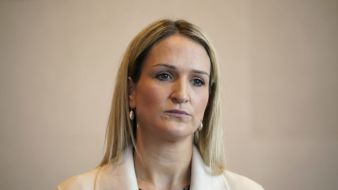A “psychic medium” has failed to overturn her conviction for conning a man into giving her €10,000 by telling him his deceased father had told her the victim should hand over the money, or “the devil would take his soul”.
Debbie Paget (56) of Knowth Court, Ballymun, Dublin was convicted by a Dublin Circuit Criminal Court jury last May.
She had pleaded not guilty to dishonestly inducing by deception James Byrne to give her €10,000.
She was also charged with dishonestly inducing by deception Maria Byrne, Mr Byrne’s sister, to give her €200.
After deliberating for a little over four hours, the jury found Paget guilty, by a majority, of the first count and returned a not guilty verdict on the second count. She was jailed for a year by Judge Pauline Codd on July 10 last.
In his evidence during the trial, James Byrne told Oisín Clarke BL, prosecuting, that he and his sister Maria and their mother lived together in Cabra, Dublin. He said Paget was a home carer for a neighbour and they all got to know her that way.
Fortune telling
He said on one occasion, Paget invited him to “a reading” and he thought this was a fortune telling and he would find out about his future. He said that that during the session Paget started talking about his father and then told him: “Your father said you are to give me €10,000.”
He said that he felt pressurised and gave his word to give her the money.
He said that Paget asked him: “When are you getting the money” and told him: “If you don't, it will be a sin and the devil will get you.” He said that he later gave her €10,000 cash in an envelope after withdrawing it from his bank account.
Asked why he gave her the money Mr Byrne told the jury: “I believed my father told her to tell me to give her the money, that’s what I believed.”
When questioned, Paget told gardaí that she was publicly known as a “psychic medium” which meant that she could “see beyond the veil” and communicate with the dead.
She said she had offered this service to people for 40 years and had “never charged a penny” to anyone for it.
She denied that she ever did “a reading” for the complainants and denied that she got any money from either of them.
Appeal
At the Court of Appeal on Friday, Karl Monahan BL, for Paget, argued that the trial judge had erred in refusing to direct a verdict of not guilty at the close of the prosecution case on the basis that the evidence was insufficient to ground a conviction and that in the circumstances it would be unfair to allow the case to be considered by the jury.
He also highlighted a conversation between Maria Byrne and her brother James Byrne, which, he said, showed Ms Byrne had lied.
Counsel said Paget had been a carer for Maria Byrne and at one point told Maria Byrne she didn’t really require a carer any more.
In submissions, Mr Monahan noted that at trial, James Byrne was asked about the subsequent conversation he had with his sister and he confirmed that Maria Byrne said: “Who does she think she effin is, watch what I’m going to do on her…she’s not getting my carers taken off me.”
Mr Justice John Edwards said the implication was that this conversation was “motivation” for “fabricating” an offence against the appellant but added it was a matter for the jury “what they make of that”
“It doesn’t render the evidence infirm…it raises the issue as to whether they can regard the evidence from the prosecution witness as credible and reliable in the light of this,” he said.
Mr Monahan argued it called into question whether there “can be injustice” in allowing the case to go ahead.
Mr Justice Edwards said it had not been demonstrated that there was a fabrication of evidence for “vindictive reasons”.
He said it was a situation where someone has made a “veiled threat” that they would do something in response to a perceived slight.
“But it’s for the jury to decide whether in fact it’s so significant that they can consider the evidence given by the prosecution witness as being not credible and not reliable. That’s the jury’s function,” the judge said.
Conversations
Mr Monahan said Ms Byrne had been shown to have lied because she denied that the conversation had taken place while her brother confirmed that it had.
Mr Justice Edwards said people lie for all sorts of reasons and the fact that a person has told a lie in a “collateral matter” does not mean that in relation to the core matters that they are necessarily untruthful.
“It’s again an issue for a jury looking at the evidence in the round,” he said.
Mr Justice Patrick McCarthy pointed out that Paget had been acquitted on the charge related to Maria Byrne.
Mr Monahan also highlighted a conversation which Ms Byrne had had with a mutual friend of hers and Paget’s. He said Ms Byrne told the woman that no money had been stolen or taken from herself and James.
He said this showed an assertion by Ms Byrne indicating that nothing was taken. He said it showed that she had “animus” against Paget because “Ms Paget was going to make an effort to, perhaps take away her carers allowance.”
In conclusion, Mr Monahan said Paget’s conviction on the charge related to James Byrne “jars” with the finding of not guilty on the other charge related to his sister given that they were “so closely bound up”.
Oisín Clarke BL, for the DPP said the core case argued by the appellant was that the case should have been withdrawn from the jury.
He said these were all jury matters and while he accepted that there were some “inconsistencies”, it would be “rare” for a case to come before a jury that didn’t have inconsistencies in prosecution witnesses.
“I’m not standing here saying there were not issues in the case, that there were not inconsistencies - there were - but they were something that the jury could consider.”
Counsel said the fact that the jury found Paget not guilty in respect of the Maria Byrne charge in effect weakened Mr Monahan’s argument because it showed that the jury were “paying attention”, did as they were told and separated the two cases.
“They decided the prosecution case was insufficient in terms of Ms Byrne but was sufficient in terms of Mr Byrne,” he said.
After hearing submissions in the case, the three judges of the court rose for a time before returning to deliver their verdict this afternoon.
Dismissing the appeal, Mr Justice McCarthy said on the face of the matter, there was “ample evidence” on which the jury could convict the appellant. He said any “inconsistencies or infirmaries” were “plainly mapped out” for the jury.
He referred to the fact that “certain challenges” to Maria Byrne’s account were advanced and said it was “not surprising” that Ms Bryne’s allegations giving rise to the indictment were rejected by the jury and that that count was the subject of an acquittal.
He said the court found the trial judge had not erred in refusing to direct a verdict of not guilty at the close of the prosecution case and the appeal was therefore dismissed.
At the sentencing hearing, Mr Monahan said that his client had a horrible family life, had witnessed domestic violence and had “a cruel and sadistic” mother. She ultimately ran away from home when she was 14 years old and stayed in a shelter for young girls until she was 17 years old.
Mr Monahan said Paget was introduced to methadone after her youngest girl was born and given a diagnosis of Cystic Fibrosis. Counsel said Paget became addicted to methadone but never used any other drug. She was left distraught by the death of her daughter in 1999.
Sentencing Paget, Judge Pauline Codd said it was quite clear from Mr Byrne’s demeanour in court that he was a vulnerable person.
She said Paget had told him that his deceased father had told her that if Mr Byrne did not give her €10,000 “the devil would take his soul”.
She said Paget was criminally liable as she had taken large sums of money under threat, “even though those are supernatural threats”. The judge described the offence as “cunning and manipulative” and that Paget had “taken advantage” of Mr Byrne.
“Far from offering him spiritual comfort, she devised a make-believe threat to his soul,” Judge Codd said.
She described Paget as “an old-fashioned confidence trickster” and added that the offence represented a breach of trust.







